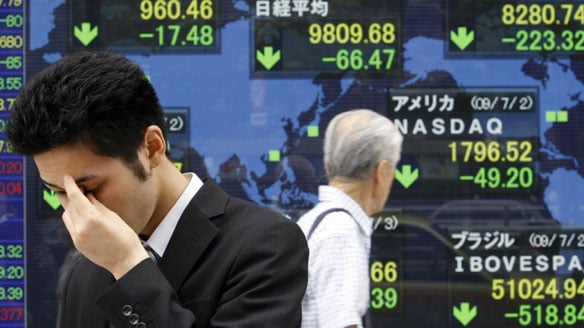
Stocks in Asia traded lower Monday afternoon following significantly weaker-than-expected Chinese trade data released over the weekend.
The mainland Chinese markets, closely watched as a result of the trade war between Beijing and Washington, slipped by the end of the morning session. The Shanghai composite declined by 0.84 percent while the Shenzhen composite shed 1.146 percent.
Meanwhile, Hong Kong’s Hang Seng index fell 1.41 percent as Hong Kong-listed shares of China Construction Bank slipped 2 percent and Chinese tech juggernaut Tencent lost 1.35 percent.
Chinese November trade data dwindles
China reported notably weaker than expected November exports and imports, which pointed to slower global and domestic demand and raised the possibility that Beijing may undertake more measures to boost growth.
November exports rose 5.4 percent from a year earlier, according to Chinese customs data on Saturday, which was below the 10 percent jump predicted by a Reuters poll. That number was also the weakest performance since a 3 percent contraction in March. The customs data showed that annual growth for exports to all of China’s major partners slowed significantly.
Import growth was 3 percent, the slowest since October 2016, and a fraction of the 14.5 percent expected in the Reuters poll. Imports of iron ore fell for a second time, reflecting waning restocking demand at steel-mills as profit margins narrow.
“China’s November trade data missed expectations by a hefty margin,” said analysts from the Commonwealth Bank of Australia in a morning note.
“Softer export growth reflects slower global growth and the fading effect of US importers’ front‑loading shipments to avoid increases in tariffs. Falling import growth points to softening domestic demand. But we expect Chinese fiscal stimulus to support imports in 2019,” they said.
Rest of Asia mostly declines
Elsewhere in the region, Japan’s Nikkei 225 fell 2.23 percent in afternoon trade while the Topix index dropped 1.95 percent.
Shares of Japan Display plunged more than 9 percent in the afternoon after the company earlier said it had no plans to cut production of its smartphone panels in December, following reports that it was planning to do so. Electronics firm Pioneer plummeted 28.41 percent on the back of its acquisition by Baring Private Equity Asia.
Meanwhile, South Korea’s Kospi also slipped around 1.3 percent, with shares of chipmaker SK Hynix dropping 2.4 percent.
Over in Australia, the ASX 200 fell 2.25 percent in afternoon trade, with almost all sectors seeing losses.
The financial subindex Down Under fell 3.05 percent as shares of Australia’s so-called Big Four Banks declined. Australia and New Zealand Banking Group dropped more than 3.7 percent and Commonwealth Bank of Australia fell 2.87 percent. Westpac slipped 3.3 percent and National Australia Bank was down 2.79 percent.
“Geo-Political issues once again look set to influence markets this week when traditionally traders expect a slow down as we head into Christmas market trading conditions,” said Rakuten Securities Australia in a note.
“Sentiment is once again expected to dominate direction as we move through today’s trading sessions and traders will be keeping a close eye on news wires for any changes in the current situation on a variety of issues,” they said.


